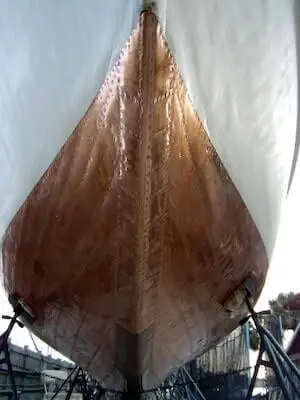A thing that is copper-bottomed, whether it be an object or an idea, is genuine; trustworthy; unlikely to fail.
Copper-bottomed
What's the meaning of the phrase 'Copper-bottomed'?
What's the origin of the phrase 'Copper-bottomed'?
If you come across something that is copper-bottomed these days, it is most likely to be a saucepan. In the 18th century, it would have been a ship.
It is unusual for an idiomatic phrase to have such a literal derivation as this. ‘Copper-bottomed’ described ships that were fitted with copper plating on the underside of their hulls.
The copper-bottoming process was first used on ships of the British Navy in 1761 to defend their wooden planking against attack by Teredo worms a.k.a. Shipworms (actually a type of bivalve clam) and to reduce infestations by barnacles.
The method was successful in protecting ships’ timbers and in increasing speed and manoeuvrability and soon became widely used. This piece from The London Magazine, March 1781, records the introduction of its use on all the ships of the Royal Navy:
Admiral Keppel made a remark upon copper bottomed ships. He said they gave additional strength to the navy and he reproached Lord Sandwich with having refused to sheath only a few ships with copper at his request, when he had since ordered the whole navy to be sheathed.
John Montagu, 4th Earl of Sandwich, may have been otherwise occupied. He is said to have once spent twenty-four hours at the gaming-table without refreshment other than some cold beef placed between slices of toast – hence giving name to the sandwich.
Before long, ‘copper-bottomed’ began to be used figuratively to refer to anything that was certain and trustworthy. Washington Irving, in his work Salmagundi, 1807, included this line:
“The copper-bottomed angel at Messrs. Paff’s in Broadway.”
It wasn’t all plain sailing. Pay attention at the back, here’s the science bit:
Copper and iron, when immersed in a suitable electrolytic fluid, like fruit juice or, at a pinch, seawater, form an electrochemical couple and the arrangement becomes a serviceable galvanic battery. Over time, the iron is eaten away to nothing by the electrochemical action.
That wasn’t good news for mariners who fixed their boat’s copper plates using iron nails – the iron eroded and the plates went to visit Davy Jones. Copper nails were the answer and soon afterwards ships began to be described not only as copper-bottomed but also copper-fastened. Such technically top-of-the-range ships were well thought of; an example is found in the 9th July 1796 edition of The Hull Advertiser:
She is copper-fastened and copper-bottomed, and a remarkable fine ship.
The expression ‘copper-fastened’ was and is used quite infrequently and is often wrongly taken to be a simple misstating of ‘copper-bottomed’. Its meaning is similar but with the emphasis on security and lack of any ambiguity, rather than of certainty and trustworthiness. It had to wait longer to be taken into metaphorical use – until the 20th century in fact. An example of such is to be found in The Evening Independent, November 1948:
We had some striking examples of what happens when a guy gets so big for his britches that any pal of his is automatically a copper-fastened genius.
See other Nautical Phrases.
The history of “Copper – bottomed” in printed materials
Trend of copper – bottomed in printed material over time
Related phrases and meanings
Browse more Phrases
About the Author

Phrases & Meanings
A-Z
A B C D E F G H I J K L M N O P Q R S T UV W XYZ
Categories
American Animals Australian Bible Body Colour Conflict Death Devil Dogs Emotions Euphemism Family Fashion Food French Horses ‘Jack’ Luck Money Military Music Names Nature Nautical Numbers Politics Religion Shakespeare Stupidity Entertainment Weather Women Work
How did we do?
Have you spotted something that needs updated on this page? We review all feedback we receive to ensure that we provide the most accurate and up to date information on phrases.
